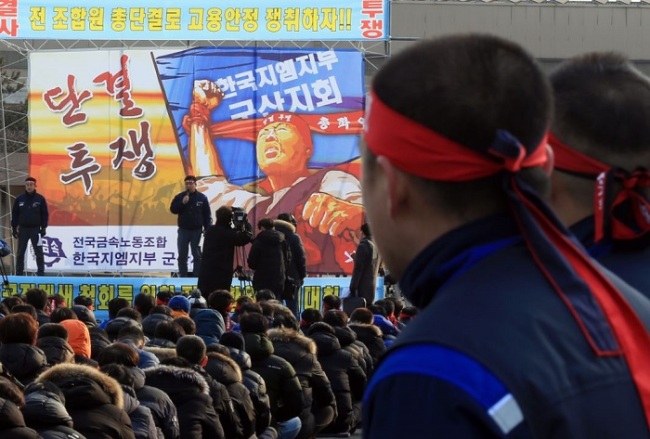Tension escalates as GM raises stake with gov.
Watchers say subsidies won‘t help based on GM’s pattern of withdrawing from other countries
By Cho Chung-unPublished : Feb. 21, 2018 - 17:08
A day after a surprise visit to the parliament, General Motors moved fast to find a compromise with the Seoul government in the form of a trillion-won support plan.
The company suggested a meeting with the trade minister this week, amid growing speculation over the US carmaker’s plans.
The Ministry of Trade, Industry and Energy confirmed Wednesday morning that Barry Engle, president of GM International, has requested a meeting with Minister Baek Ung-kyu before returning to the US on Thursday. But the meeting was called off, the ministry said later in the evening, citing his official trip to Busan. Vice Minister Lee In-ho will meet Engle instead in Seoul, it added.
Earlier in the day, Minister Baek demanded the US carmaker on Wednesday to bring long-term plans both on investments and labor management on the table first.
“(GM) has to have visible plans when we meet,” the minister told lawmakers, adding that demands that he made are prerequisite for a negotiation.
The company suggested a meeting with the trade minister this week, amid growing speculation over the US carmaker’s plans.
The Ministry of Trade, Industry and Energy confirmed Wednesday morning that Barry Engle, president of GM International, has requested a meeting with Minister Baek Ung-kyu before returning to the US on Thursday. But the meeting was called off, the ministry said later in the evening, citing his official trip to Busan. Vice Minister Lee In-ho will meet Engle instead in Seoul, it added.
Earlier in the day, Minister Baek demanded the US carmaker on Wednesday to bring long-term plans both on investments and labor management on the table first.
“(GM) has to have visible plans when we meet,” the minister told lawmakers, adding that demands that he made are prerequisite for a negotiation.

Engle, in his previous meeting with Baek on Jan. 9, has reportedly asked the Seoul government to have its Korea Development Bank, the second-largest shareholder of GM Korea, to increase its capital and provide financial assistance and tax benefits. It has also requested to designate its plants in Bupyeong, Incheon, and Changwon, South Gyeongsang Province, as special investment zone for foreign entities.
But Baek reiterated the government’s earlier position to review GM Korea’s management and cash flow first before making a “fresh investment.”
The state-run KDB will have a local accounting firm, Samil PricewaterhouseCooper, conduct a review into GM Korea’s financial sheet, according to local reports on Wednesday afternoon. The due diligence, if launched this month, is expected to take about two to three months, far longer than GM’s so-called “deadline.”
Engle had previously said that another restructuring plan will be announced by the end of the month, while urging stakeholders -- the government and the labor -- to join the company’s efforts in normalizing its operation.
The GM president setting the timeline of the second part of the restructuring plan was widely seen as sending an ultimatum, pushing the government to make pledges of fresh investment and the labor to agree on cutting wages.
Despite the government making a careful approach by putting the review on GM first, it will be difficult to discover any suspicious link between GM and GM Korea, said Lee Hang-koo, a researcher at the Korea Institute for Industrial Economics and Trade.
“Earlier this year, GM already went through a review of last year’s financial sheet but they found nothing wrong. Since we don’t have access to financial statements between GM, the parent company, and its affiliate, GM Korea, it is difficult to find any problem in Korea,” he said.
After announcing its shut down plan of its plant in Gunsan, South Jeolla Province, critics have been attacking the motive behind GM Korea’s decision.
Local reports quoting industry watchers raised suspicions that the US carmaker has intentionally exaggerated the losses of its South Korean operations, by applying higher interests on intercompany loans. GM Korea covered extensive costs on R&D investments while selling complete knock-down products overseas at lower prices.
Rep. Hong Young-pyo, head of GM task force committee at the ruling Minjoo Party, contended in a radio interview that the operation of GM Korea can be normalized only by injecting fresh investment worth 2 to 3 trillion won, on top of the debt-to-equity conversion that the US carmaker has offered in exchange of Seoul government’s support.
“The task is how much of a portion of the fresh investment KDB could take,” he said, adding that the US carmaker has also asked for other benefits and incentives within the boundary of regulations.
The Moon Jae-in government has been tiptoeing around as GM’s plant closure came a few months before the general election, possibly dealing a blow to the ruling party campaign.
The nationwide election in June is expected to serve as a political barometer on the liberal government that has prioritized labor issues for its policy drive.
Amid the government facing a dilemma of whether to support GM in exchange of saving jobs there, local critics said that any amount of government funding to GM Korea wouldn’t change the situation.
“Injection of public funds will only buy time for the US carmaker and that is the last thing the government should do,” said Kim Pil-soo, automobile engineering professor at Daelim University.
“GM has given similar requests to other governments before pulling off. But eventually the company left them.”
The announcement follows GM’s decision to stop selling cars in India last year, and end manufacturing in Australia in 2016. In 2015, the company exited Russia and sold its European division to French automaker PSA Groupe.
By Cho Chung-un (christory@heraldcorp.com)



















![[Today’s K-pop] BTS pop-up event to come to Seoul](http://res.heraldm.com/phpwas/restmb_idxmake.php?idx=642&simg=/content/image/2024/04/17/20240417050734_0.jpg&u=)